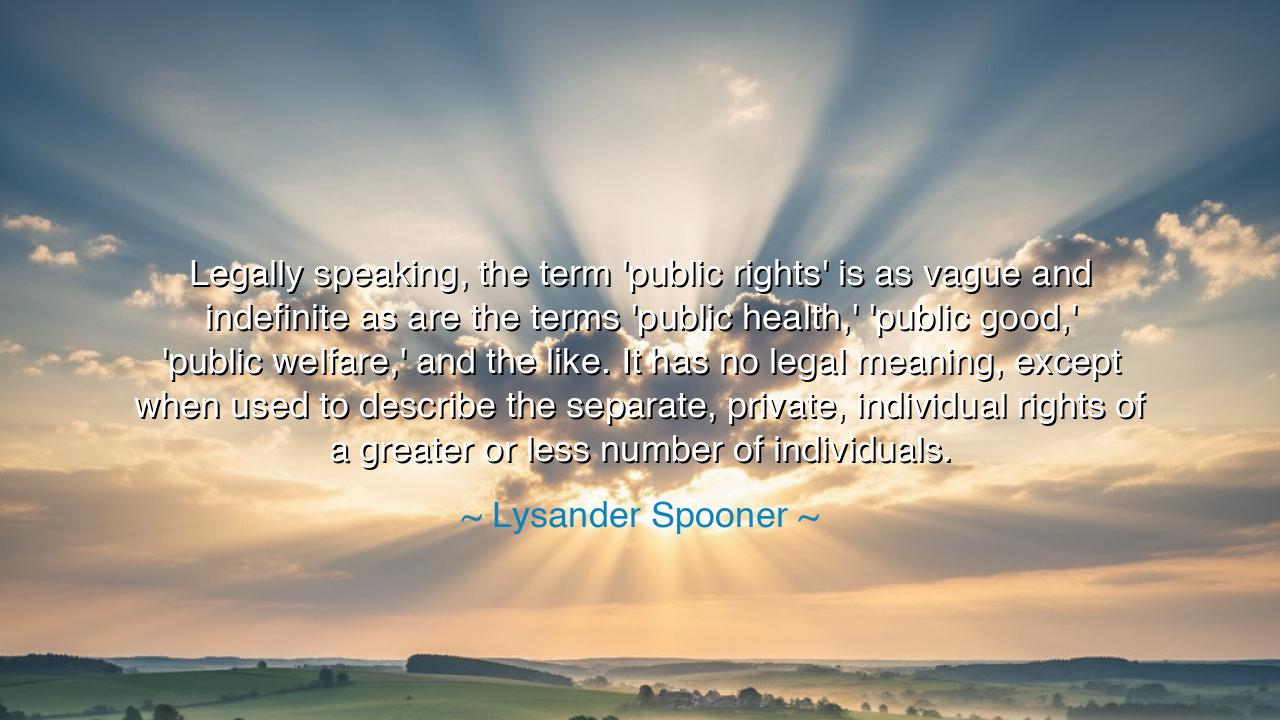
Legally speaking, the term 'public rights' is as vague and
Legally speaking, the term 'public rights' is as vague and indefinite as are the terms 'public health,' 'public good,' 'public welfare,' and the like. It has no legal meaning, except when used to describe the separate, private, individual rights of a greater or less number of individuals.






In the words of Lysander Spooner: “Legally speaking, the term ‘public rights’ is as vague and indefinite as are the terms ‘public health,’ ‘public good,’ ‘public welfare,’ and the like. It has no legal meaning, except when used to describe the separate, private, individual rights of a greater or less number of individuals.” These words are not the mere musings of a scholar, but the cry of a man who looked upon the language of power and saw it cloaked in ambiguity. He warns us that the veil of noble-sounding phrases may conceal the theft of liberty, for when the law speaks in riddles, it leaves the door open to tyranny.
The ancients themselves were wary of words too broad, for they knew that when rulers say “for the public good,” often what they mean is “for the benefit of the few who hold power.” Spooner’s insight lies in this: that there is no such thing as a single, abstract public right apart from the living, breathing rights of individuals. The public is not an entity with a soul or a will; it is but the gathering of many persons, each with their own dignity, their own freedom, their own claim to justice. To speak of the public while trampling the individual is to build a temple of justice upon the bones of those it should protect.
Consider the story of the Roman Republic, when senators and magistrates often invoked the phrase salus populi suprema lex esto—“the welfare of the people shall be the supreme law.” Yet in times of unrest, this phrase was wielded not to protect the people, but to suppress them. The Gracchi brothers, who sought land reform to aid the poor, were slain in the name of the public good. Thus, the cry of the public welfare became the tool of the privileged to silence the cry of the oppressed. Spooner, with prophetic clarity, reminds us that such lofty words mean nothing if they are not tied to the individual rights they claim to serve.
His message also resonates in the more recent tale of the Alien and Sedition Acts in America. These laws, justified under the guise of protecting the public welfare, criminalized speech against the government. Yet in truth, they violated the very individual rights of free expression upon which the republic had been founded. Here we see Spooner’s truth unveiled: that vague appeals to the public often mask the betrayal of the very freedoms that give society its strength. Only when the rights of each person are honored can the phrase “public good” have substance.
The meaning of this quote, then, is both caution and command. Beware of words like public rights when they float unanchored, for they are clouds without rain, promises without weight. True law must be rooted in the soil of the individual. When one man’s freedom is secured, and another’s, and yet another’s, then together they form the chorus we call the public. But to strip away the rights of the one for the vague benefit of the many is to plant seeds of injustice that will one day choke the garden of liberty.
The ancients would teach that clarity is the soul of justice. If the law is to endure, its words must be sharp and true, like a blade that cuts cleanly. Vague phrases invite corruption, for they allow the powerful to twist meaning to their advantage. Spooner’s challenge is thus a timeless one: demand precision, demand honesty, demand that leaders name what they mean, and defend what they claim to protect.
So let this teaching be passed on: do not be deceived by grand words without anchor. Ask always: whose rights are preserved, whose freedom is secured, whose dignity is defended? For only when the individual rights of real people are upheld does the phrase “public good” shine with truth. In daily life, honor the rights of your neighbor as you would your own, for in defending the smallest liberty, you preserve the greatest. And remember: the strength of a society is not in vague promises, but in the unbroken chain of individual freedoms, linked together to form the whole.






AAdministratorAdministrator
Welcome, honored guests. Please leave a comment, we will respond soon